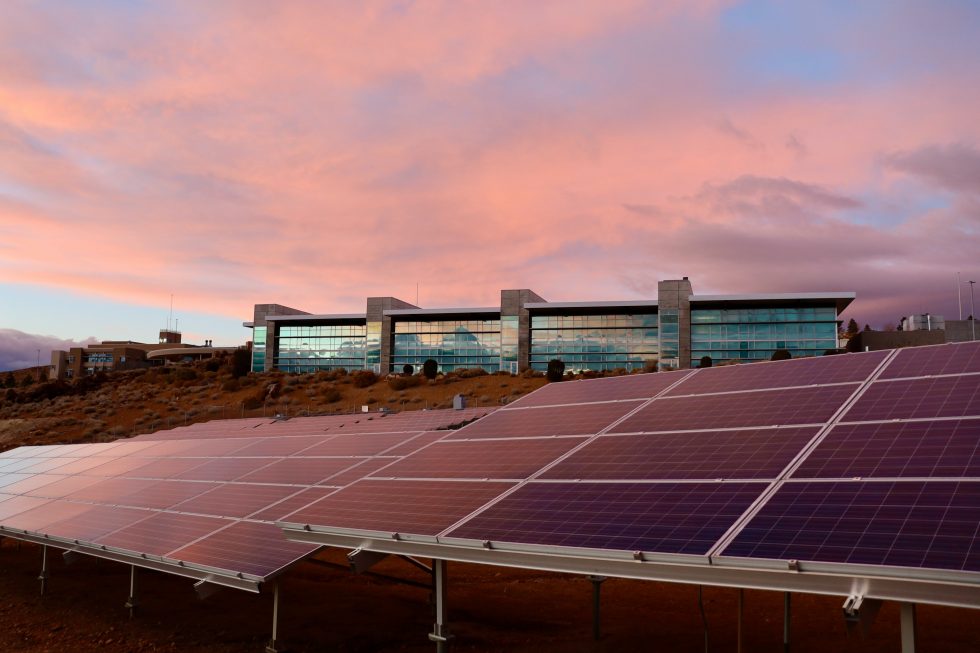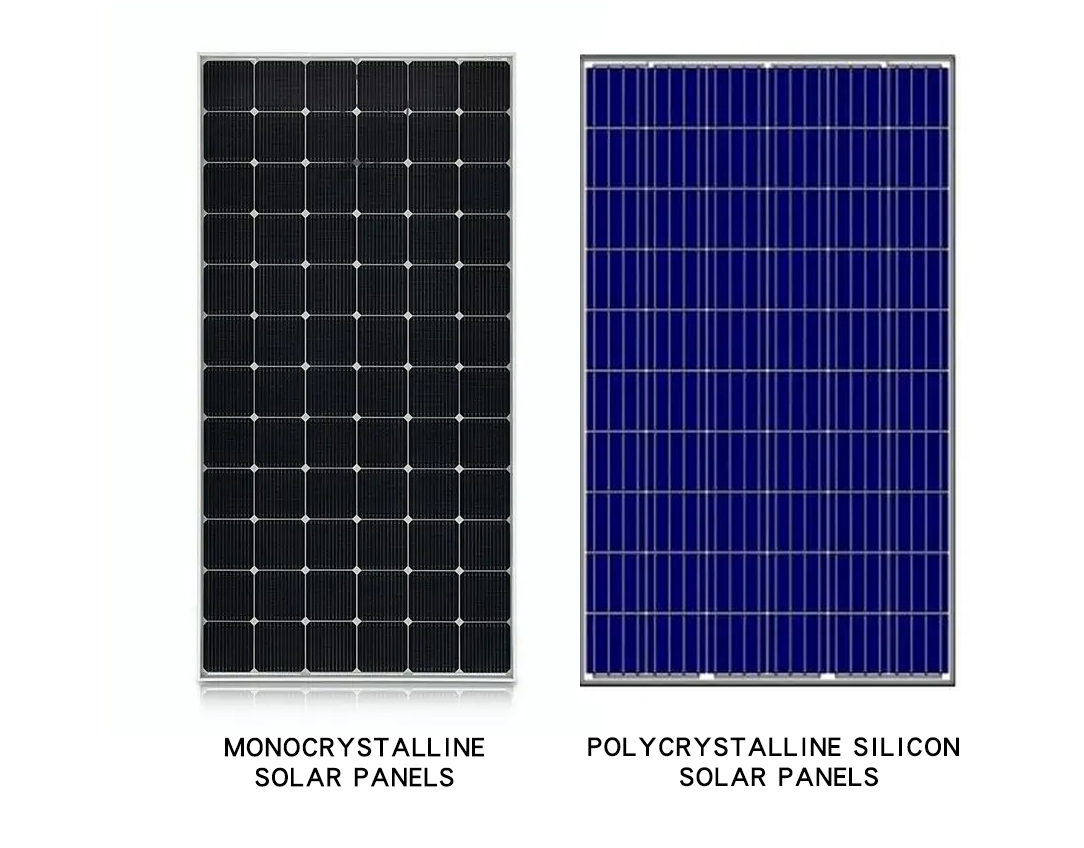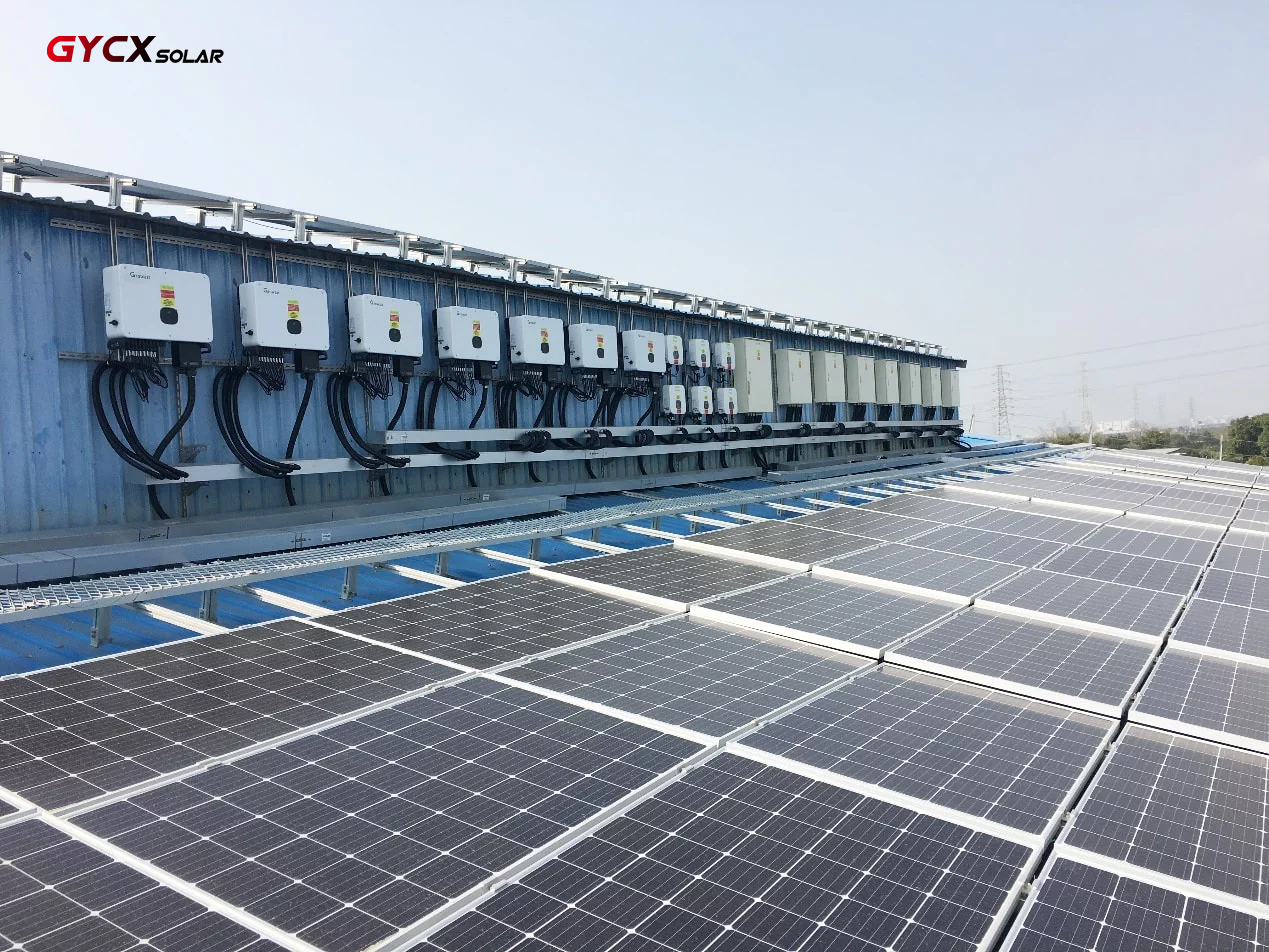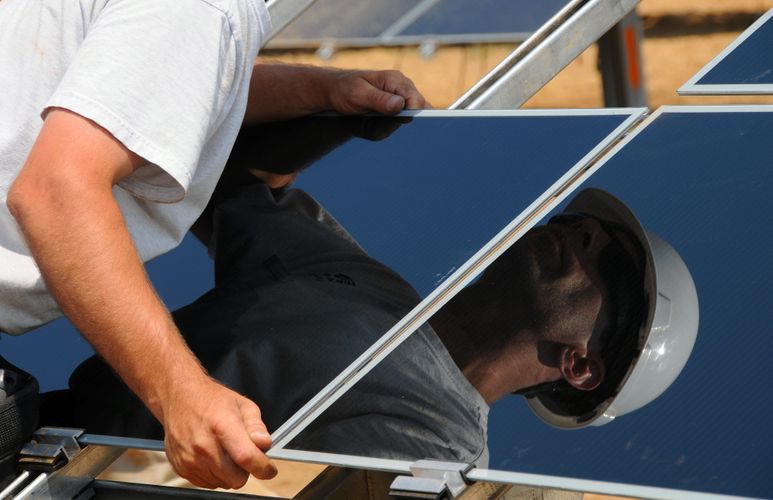Wussten Sie, dass die Investition in Solarpanelsysteme eine langfristig nachhaltige Maßnahme ist?? Mit den steigenden Strompreisen, Solarmodule sind eine großartige Möglichkeit, die Energiekosten zu senken und die Umwelt zu schützen.
Aufgrund der großen Vielfalt an Solar-PV-Modulen, Es ist nicht einfach herauszufinden, welches für Ihr Unternehmen das Richtige ist. Bevor Sie die Vorteile sauberer Energie genießen können, Sie müssen verstehen, wie Sie den richtigen Typ eines kommerziellen Solarmoduls am besten auswählen, welche Art von Solarwechselrichter verwendet werden soll, und die am meisten empfohlenen Installationsoptionen für Solarpanelsysteme.

Solarpanel und ihre Bedeutung
Ein Solarpanel ist eine Art Gerät, das Lichtenergie nutzt, um sie in Elektrizität umzuwandeln, und ist eine der Kernkomponenten des Solarstromerzeugungssystems. Es wandelt Sonnenlicht durch den Photovoltaikeffekt direkt in Strom um, ohne bewegliche Teile, und hat die Vorteile des Umweltschutzes, leise und zuverlässig. Solarmodule bestehen typischerweise aus mehreren Solarzellen, die Sonnenlicht in Gleichstrom umwandeln, Dieser kann dann von einem Wechselrichter für den Heim- oder Industriegebrauch in Wechselstrom umgewandelt werden.
Als wichtiger Bestandteil erneuerbarer Energien, Solarmodule spielen eine entscheidende Rolle im heutigen Umweltschutz und der Energiewende. Die Wahl des richtigen kommerziellen Solarmoduls kann Unternehmen nicht nur dabei helfen, Energiekosten zu sparen, sondern verringern auch die Abhängigkeit von traditionellen Energiequellen und verringern die negativen Auswirkungen auf die Umwelt.
Es fördert nicht nur die Entwicklung erneuerbarer Energien, sondern trägt auch zum Umweltschutz bei, verbesserte Energiesicherheit, und wirtschaftliche Vorteile, Gleichzeitig werden die Ziele einer nachhaltigen Entwicklung erreicht.
Warum ist es wichtig, sich für ein kommerzielles Solarpanel zu entscheiden??
Unternehmen können von einer Reihe von Vorteilen profitieren, wenn sie kommerzielle Solarmodule als Stromquelle installieren, Es ist jedoch wichtig, dass wir zunächst verstehen, wie wir die beste Sorte auswählen, damit Sie das Beste aus Ihrer Investition herausholen können. Schließlich, Solar-Kits sind nicht billig, und Sie müssen die beste Strategie für die Auswahl von Solarmodulen für Ihr Unternehmen entwickeln.
Verstehen Sie, dass einer der Vorteile der Auswahl von Solarmodulen mit der Gesamtkosteneffizienz zusammenhängt. Wenn Sie wissen, wie Sie das richtige Solarpanel auswählen, Sie können hinsichtlich der Investitionen vorbereitet sein und das Geld, das Sie für Solarmodule ausgeben, optimal nutzen.
Wenn Sie wissen, wie Sie ein Solarmodul auswählen, können Sie auch herausfinden, welches Zubehör oder welche Geräte am besten für Sie geeignet sind. Weil, wenn es um den Zusammenbau eines Solarpanel-Bausatzes geht, Der richtige Solarmodultyp ist nur ein kleiner Teil der Gleichung. Sie benötigen außerdem Solarwechselrichter, Installationswerkzeuge, Ladegeräte, Backup-Geräte und mehr. Wenn Sie über die richtigen Informationen zu diesen zusätzlichen Werkzeugen verfügen, stellen Sie sicher, dass Sie nur in Werkzeuge investieren, die zu Ihrem Solarpanelsystem passen.
Arten von Solarmodulen
Die Arten von Solarmodulen decken mehrere gängige Materialien und Herstellungsverfahren ab, jedes mit seinen eigenen einzigartigen Eigenschaften und Anwendungsszenarien. Die Erfindung und Entwicklung von Solarmodulen hat rasante Fortschritte gemacht, Je nach Art des Solarmoduls kann es in die erste Generation unterteilt werden, die zweite Generation und die dritte Generation:
Erste Generation von Solarmodulen
Es handelt sich um monokristalline Solarmodule und polykristalline Silizium-Solarmodule, jeweils, und sind die traditionellen Typen, die häufig in typischen Umgebungen verwendet werden.
| Monokristalline Solarmodule (MONO-JA) | Dies ist die reinste Art von Solarpanel und ein effizientes und stabiles Energieumwandlungsgerät. Es eignet sich für Anwendungsszenarien, die Platzeffizienz erfordern, insbesondere für Energiesysteme, die einen langfristig stabilen Betrieb erfordern. Sie haben ein einheitliches dunkles Aussehen und abgerundete Kanten. Sie zeichnen sich durch eine hohe Leistungsausbeute aus, längste Lebensdauer und Platzersparnis. Im Gegensatz zu polykristallinen Silizium-Solarmodulen, Sie sind nicht anfällig für hohe Temperaturen. Aber trotz aller Vorteile, Monokristalline Solarmodule sind im Allgemeinen eine teurere Option. |
| Polykristalline Silizium-Solarmodule (Poly-SI) | Polysilizium-Solarmodule werden durch Schmelzen von Primärsilizium hergestellt, Dies kann ein schnellerer und wirtschaftlicherer Prozess sein als die Herstellung von Einkristallplatten. Dies macht sie zu einer günstigeren Option. Die polykristallinen Platten haben einen blaueren Farbton, und ihre Ecken sind nicht geschnitten. Es ist normalerweise weniger effizient und hat eine kürzere Lebensdauer als ein Einkristallpanel. Jedoch, Sie sind im Allgemeinen günstiger, und obwohl Sie zusätzliche Panels benötigen, Sie könnten eine günstigere Option sein. |

Solarpanel der zweiten Generation
Solarpanel der zweiten Generation, sogenannte „Dünnfilm“-Typen, werden häufig in Photovoltaik-Kraftwerken oder kompakten Solaranlagen in Gebäuden eingesetzt.
| Dünnschichtsolarzellen (TFSC) | Hierbei handelt es sich um ein Gerät, das Dünnschicht-Halbleitermaterialien verwendet, um Lichtenergie durch den photoelektrischen Effekt in Elektrizität umzuwandeln. Sie werden hergestellt, indem ein oder mehrere dünne Filme aus photovoltaischem Material auf ein Substrat gelegt werden. Einige Solarmodule sind am einfachsten herzustellen, da für ihre Herstellung weniger Material benötigt wird, daher sind sie auch relativ günstig. Sie sind flexibel und weniger anfällig für hohe Temperaturen. Jedoch, aufgrund ihrer kurzen Lebensdauer im Vergleich zu einkristallinen und polykristallinen Solarmodulen, Sie erhalten die kürzeste Garantiezeit. |
| Amorphe Silizium-Solarzellen (Da ich) | Ein Allotrop von Silizium, Diese Art von Solarmodulen verwendet die Dreischichttechnologie und gilt als die beste der Dünnschichtvarianten. Sie werden häufig in solarbetriebenen Taschenrechnern verwendet. „Dünn“ bedeutet, dass die Dicke dieser Filme ca. beträgt 1 Mikron. Diese Solarzellen sind nicht so effizient wie kristalline Siliziumtypen, sind aber relativ preiswert. |
Solarpanel der dritten Generation
Unter der dritten Generation versteht man verschiedene Dünnschichttechnologien, Die meisten davon befinden sich noch im Entwicklungs- oder Forschungsstadium, das kann zu mehr Effizienz führen, umweltfreundlich, und kostengünstige Solarzellen in der Zukunft.
| Bio-Hybrid-Solarzellen | Biologische Hybridsolarzellen, die sich noch im Forschungsstadium befinden, sind ein neues Forschungsgebiet der Solarzellen. Es kombiniert Biotechnologie und Photovoltaik-Technologie, um eine photoelektrische Umwandlung durch bestimmte photosynthetisierende Organismen zu erreichen. Bio-Hybrid-Solarzellen, die sich noch im Forschungsstadium befinden. |
| Cadmiumtellurid-Solarzellen (CdTe) | Die Solarzelle besteht aus Cadmiumtellurid, ein Halbleitermaterial, das zur Herstellung infrarotoptischer Fenster verwendet werden kann. Das Produkt ist günstiger und die Amortisationszeit ist kürzer. CdTe-Solarzellen sind effizient, stabil und umweltfreundlich, So können Sie Ihren CO2-Fußabdruck so gering wie möglich halten. Jedoch, Das Produkt kann beim Einatmen oder Verschlucken giftig sein. |
| Konzentrierende Photovoltaikzellen (CVP und HCVP) | Diese Zellen erzeugen Strom auf die Art und Weise, wie es typische Photovoltaikanlagen tun, durch den Einsatz optischer Komponenten, um das Sonnenlicht auf die Solarzelle zu fokussieren. Ihre Effizienz liegt bei 41%, der höchste Wert aller bisherigen Photovoltaikanlagen. Sie haben gebogene Spiegel, Linsen und Kühlsysteme, die zur Effizienzsteigerung beitragen. Es umfasst hauptsächlich zwei Arten konzentrierter Photovoltaikzellen (CPV) und hochkonzentrierte Photovoltaikzellen (HCPV). |
Tipps zur Auswahl des besten kommerziellen Solarmoduls
Bei der Auswahl des besten Solarmoduls für Ihr Unternehmen sind viele Faktoren zu berücksichtigen. Sie können dann alle Optionen filtern und am Ende das Solarmodul finden, das Sie benötigen und das zu Ihnen passt. Hier sind einige der wichtigsten Faktoren:
1.Effizienz von Solarmodulen
Der Wirkungsgrad eines Solarmoduls wird berechnet, indem die Nennleistung durch die Gesamtfläche des Moduls geteilt wird. In den letzten Jahren, Die Effizienz des Solarpanels war nur 15%, und jetzt die kontinuierliche Verbesserung der Photovoltaik-Technologie, Der Wirkungsgrad von Solarmodulen beträgt mittlerweile mehr als 20%. Hocheffiziente Panels können mit weniger Panels mehr Strom erzeugen, Daher sind sie eine gute Wahl, wenn Sie nur wenig Platz haben.
2.Garantierechnung
Garantien sollen Ihre Verbraucherrechte schützen, genau wie jedes andere Produkt, das wir kaufen. Solarpanel haben 2 Garantien, nämlich Produktgarantie und Leistungsgarantie. Eine Stromgarantie gibt an, wie effizient das Solarmodul noch viele Jahre nach der Installation arbeitet. Eine Produktgarantie ist die Anzahl der Jahre, die Ihnen der Hersteller garantiert, falls mit Ihrem Solarmodul etwas schief geht. Stellen Sie sicher, dass Sie mit einem zuverlässigen Solarunternehmen oder Solarproduktanbieter zusammenarbeiten, wie GYCX Solar, die Ihnen eine attraktive Garantie bieten kann. Dies wird dazu beitragen, Ihre Investition zu maximieren, wenn in Zukunft Produktfehler auftreten.
3.Herstellungs- oder Herkunftsland
Es lohnt sich auch, darüber nachzudenken, wo Ihr Solarmodul hergestellt wird oder welches Herkunftsland es hat, was durchaus notwendig ist. Momentan, Der weltweit größte Solarproduzent ist China, die Vereinigten Staaten, Indien, Japan und Vietnam. Diese Länder beweisen weiterhin, dass Solarenergie eine legitime erneuerbare Energiequelle ist, indem sie das Potenzial der Solarstromerzeugung nutzen. Ideal ist es, bei Unternehmen einzukaufen, die Produkte aus diesen Ländern beziehen.
4.Haltbarkeit
Haltbarkeit ist ein wichtiger Faktor, der berücksichtigt werden muss, Das Solarpanel wird verschiedenen Umgebungen ausgesetzt, Sie müssen also langlebig sein. Dies trägt nicht nur dazu bei, die dauerhafte Leistung des Panels zu gewährleisten, wirkt sich aber auch auf die Gesamtkosteneffizienz des Panels aus. Fragen Sie unbedingt den Hersteller nach der Langzeithaltbarkeit. Seriöse Anbieter von Solarmodulen müssen einige Tests ihrer Produkte durchführen, um deren Wirksamkeit zu bestätigen. Sie müssen mit Ihnen über die Ergebnisse dieser Tests sprechen.
5. Spezifikationen des Solarmoduls
Die Spezifikationen des Solarmoduls sind im Allgemeinen in der Spezifikationstabelle aufgeführt. Diese Tabelle enthält wichtige Informationen zu den Betriebsparametern des Solarmoduls. Einige der im Datenblatt enthaltenen Angaben umfassen die Spannung, Solarpanel -Effizienz, Stromerzeugung, Größe, und Windlast. Diese Angaben helfen Ihnen nicht nur bei der Auswahl des besten Solarmoduls, Aber helfen Sie Ingenieuren und Installateuren auch dabei, zu verstehen, wie Sie Ihre Solaranlage konfigurieren.
Der Kauf und die Installation von Solarmodulen ist eine langfristige Investition, und zusätzlich zu den oben genannten Faktoren, Bei der Auswahl des richtigen kommerziellen Solarmoduls sind noch weitere Faktoren zu berücksichtigen, einschließlich Outdoor-Kompatibilität und Installation, Providerwartung, Temperaturkoeffizient, Art der verwendeten Solarzelle, Ort und Dauer der Arbeit. Um sicherzustellen, dass Sie die maximale Rendite für Ihre Investition erzielen, ist ein sehr strenger Auswahlprozess erforderlich.
Wählen Sie den richtigen Solarwechselrichter
Ohne Wechselrichter kann das Solarpanel nicht betrieben werden, welches ein integraler Bestandteil des Systems ist. Zusätzlich zur Auswahl des richtigen Solarmoduls, Sie müssen auch den richtigen Solarwechselrichter auswählen, um das ideale Solarstromerzeugungssystem zu vervollständigen. Solarwechselrichter wandeln Gleichstrom um (Gleichstrom) Vom Solarpanel erzeugter Strom wird in Wechselstrom umgewandelt (Wechselstrom) Strom für den Betrieb Ihrer Geräte und Anlagen. Solarwechselrichter werden hauptsächlich in drei Kategorien unterteilt:
Netzgekoppelte Wechselrichter: Sie wandeln Gleichstrom in Wechselstrom um und speisen dann überschüssige Energie zurück ins Netz, wo sie auch an das öffentliche Stromnetz angeschlossen sind. Netzgekoppelte Wechselrichter werden häufig in einigen Anwendungen eingesetzt, bei denen Gleichspannungsquellen an das Netz angeschlossen sind.
Inselnetz-Wechselrichter: Es wandelt Gleichstrom um (Gleichstrom) auf Wechselstrom (Wechselstrom), und sie können Wohn- und Gewerbeprojekte mit Strom versorgen. Es kann ohne öffentlichen Netzanschluss genutzt werden. Typischerweise wird es in erneuerbaren Energiesystemen wie Solarmodulen oder kleinen Windkraftanlagen eingesetzt, Dabei wird der von diesen Geräten erzeugte Gleichstrom in einer Batterie gespeichert und dann in Wechselstrom umgewandelt, um ihn bei Bedarf von elektrischen Geräten in Häusern oder abgelegenen Gebieten nutzen zu können. Inselnetz-Wechselrichter können in Situationen wie geringer Leistung oder in der Nacht Stromunterstützung leisten, Verringerung der Abhängigkeit vom traditionellen Netz.
Hybrid-Wechselrichter: Es kann Gleichstrom in Wechselstrom umwandeln und ist ein fortschrittliches Stromumwandlungsgerät. Es vereint die Funktionen von netzgekoppelten Wechselrichtern und Inselwechselrichtern, kann sowohl für netzgekoppelte Systeme als auch für netzunabhängige Systeme eingesetzt werden, und besitzt die Fähigkeit, elektrische Energie zu speichern.

So wählen Sie einen Installateur für Solarmodule aus?
Die Auswahl des idealen Solarinstallateurs erfordert eine Reihe von Entscheidungen. Bevor Sie sich für Hersteller von Solarmodulen entscheiden, Wir müssen zuerst ihre Marke und Glaubwürdigkeit verstehen, und wählen Sie Unternehmen mit guter Sichtbarkeit und gutem Ruf. Gleichzeitig, Es gibt Produktqualität, Die Produktqualität von Solarmodulen steht in direktem Zusammenhang mit der Effizienz der Stromerzeugung. Durch die Bewertung dieser Faktoren und die Rücksprache mit einem seriösen Solarinstallateur, wie GYCX Solar, Sie können das beste Solarpanel finden, das Sie benötigen, und beginnen, Energieunabhängigkeit zu erleben.

Abschluss
Zusamenfassend, Die Wahl des richtigen kommerziellen Solarmoduls für Ihr Firmeneigentum ist eine wichtige Entscheidung, die sorgfältige Überlegung erfordert. Jedoch, indem Sie die Richtlinien in unserem umfassenden Leitfaden befolgen, Sie können eine fundierte Entscheidung treffen und das perfekte Solarmodul für Ihren Energiebedarf auswählen.
Wenn Sie noch Fragen haben oder weitere Hilfe benötigen, Bitte wenden Sie sich an GYCX Solar Experten, die über die Erfahrung und das Wissen verfügen, um eine Lösung zu entwickeln, die perfekt zu Ihren kommerziellen Solarmodulanforderungen passt, und Ihnen dabei helfen, die richtige Wahl zu treffen. GYCX Solar ist ein Branchenspezialist aus einer Hand. Wir kontrollieren unsere Produkte streng und führen Vor-Ort-Kontrollen bei Lieferanten durch. Unsere grundlegende Markenphilosophie besteht darin, unseren Kunden einen qualitativ hochwertigen End-to-End-Service zu bieten. Wählen Sie uns und Sie werden von der Beratung bis zum After-Sales ein nahtloses Erlebnis haben, Und wir stehen Ihnen bei jedem Schritt als professioneller Partner zur Seite.
FAQ
Welche Arten von Solarmodulen eignen sich am besten für den gewerblichen Einsatz??
Einkristalline Solarmodule sind für Unternehmen oft die erste Wahl, die eine hohe Conversion-Rate und einen geringen Platzbedarf haben.
Wie lange hält ein Solarpanel??
Für viele Solarmodule gibt es heute Garantien, die ihre Verwendung garantieren 15 Zu 25 Jahre. Nach dieser Zeit, Das Panel funktioniert möglicherweise noch, wenn auch etwas weniger effizient.
Wie viel Wartung benötigen Solarmodule??
Solarmodule erfordern sehr wenig Wartung. Die einzige Pflege, die erforderlich ist, besteht darin, den Schmutz zu entfernen, Blätter, oder Schnee von ihnen, aber das muss nicht oft gemacht werden.
